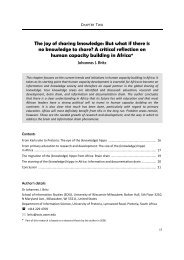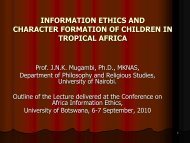Information Ethics in Africa: - Africa Information Ethics Portal
Information Ethics in Africa: - Africa Information Ethics Portal
Information Ethics in Africa: - Africa Information Ethics Portal
You also want an ePaper? Increase the reach of your titles
YUMPU automatically turns print PDFs into web optimized ePapers that Google loves.
Understand<strong>in</strong>g <strong>Information</strong> <strong>Ethics</strong>of dependence, <strong>in</strong>troduc<strong>in</strong>g new power relationships. Most organisations and <strong>in</strong>stitutions around theworld rely on some form of ICT for their daily operations, and ICT has become the default technologyfor most of the socio-economic activities of those liv<strong>in</strong>g <strong>in</strong> the First World. Organisational changes andbenefits that it has brought about are no longer <strong>in</strong> question (Introna, 2005).Accord<strong>in</strong>g to Freeman and Louca (2002), the impact of these technologies arises from three oftheir characteristics. In the first place, ICT is an enabl<strong>in</strong>g technology that has not only become<strong>in</strong>strumental <strong>in</strong> most of our activities, but also contributes to further technological development andchanges. Secondly, it has grown, <strong>in</strong> terms of its capacity, exponentially over the last couple our years;and thirdly, it has become cheaper, mak<strong>in</strong>g it more affordable and accessible to nearly everyone. Assuch, the <strong>in</strong>troduction of new and modern ICT opens up new possibilities for libraries and other<strong>in</strong>formation agencies. The most important of these is the digitisation and consequent manipulation of<strong>in</strong>formation. This has far-reach<strong>in</strong>g implications, not only for the different <strong>in</strong>formation-based activitiesperta<strong>in</strong><strong>in</strong>g to the life cycle of <strong>in</strong>formation, but also with regard to the ethical issues relat<strong>in</strong>g to these<strong>in</strong>formation-based activities. The digitisation of <strong>in</strong>formation allows, for the first time, the unbundl<strong>in</strong>g of<strong>in</strong>formation from its orig<strong>in</strong>al physical carriers, such as objects (e.g. an airl<strong>in</strong>e ticket), paper and otherpr<strong>in</strong>t material <strong>in</strong> a different and unique way that previous ICTs, <strong>in</strong>clud<strong>in</strong>g writ<strong>in</strong>g and pr<strong>in</strong>t<strong>in</strong>g, were notable to do. Pre-digital <strong>in</strong>formation technologies did not have the ability to simultaneously reachmillions of people and allow synchronic <strong>in</strong>teractivity and the customisation of needs. Due to modernICT, digitised <strong>in</strong>formation has become <strong>in</strong>terl<strong>in</strong>ked (hypermedia), can ‘travel by itself’ at nearly zerocost, and can reach more people <strong>in</strong> an <strong>in</strong>teractive way. Examples <strong>in</strong>clude e-mail, webcamtechnologies, as well as <strong>in</strong>teractive TV. There has <strong>in</strong>deed been a move from “textuality (writ<strong>in</strong>g andpr<strong>in</strong>t<strong>in</strong>g) to multimediality” (L<strong>in</strong>guist, 1998:6). It is with<strong>in</strong> this context that philosophers such as Rucker(1988) and De Mul (2003) remark that “everyth<strong>in</strong>g has become <strong>in</strong>formation”. Modern ICT, <strong>in</strong>clud<strong>in</strong>gthe camera and other digital technologies like the computer, has therefore permanently establishedour global <strong>in</strong>formation-based world <strong>in</strong> the 20 th century. These technologies allow for the masscustomisation of users’ needs, <strong>in</strong>clud<strong>in</strong>g, especially, <strong>in</strong>formation needs (Evans & Wurster, 1997). Agood example of the ability to customise <strong>in</strong>formation accord<strong>in</strong>g to users’ needs is the onl<strong>in</strong>e book<strong>in</strong>gof airl<strong>in</strong>e tickets where people can select their seats as well as meals onl<strong>in</strong>e; <strong>in</strong>deed, a customerwithout access to ICT is at a significant disadvantage <strong>in</strong> this example. Service costs are <strong>in</strong> manycases higher for those who do not have access to the Internet – a good example is the bank<strong>in</strong>g<strong>in</strong>dustry. In a country such as South <strong>Africa</strong>, Internet bank<strong>in</strong>g is encouraged by mak<strong>in</strong>g ‘face-to-face’bank<strong>in</strong>g more expensive. This has <strong>in</strong>troduced a new form of ‘<strong>in</strong>formation exclusion anddiscrim<strong>in</strong>ation’.Modern ICT has therefore profoundly changed the notions of privacy and of access to<strong>in</strong>formation. Access to <strong>in</strong>formation is no longer limited to access<strong>in</strong>g the ideas of others or freedom ofexpression. It has also become a socioe-conomic right that opens the opportunity for people toparticipate (onl<strong>in</strong>e) <strong>in</strong> the various socio-economic and political activities. It also <strong>in</strong>troduces newasymmetric <strong>in</strong>formation relationships whereby people (<strong>in</strong> terms of their personal and private<strong>in</strong>formation) are be<strong>in</strong>g ‘unbundled’ and observed without their know<strong>in</strong>g it.ReferencesBritz, J.J. (1996a). Inligt<strong>in</strong>gsetiek – met spesifieke verwys<strong>in</strong>g van die beroep van die <strong>in</strong>ligt<strong>in</strong>gkundige: ’nChristelike perspektief. DD Proefskrif. Pretoria: Universiteit van Pretoria.Capurro, R. (2006). ICIE: The Field. Retrieved December 24, 2012, http://icie.zkm.de/research.De Mul, J. (2003). Cyberspace odyssee. Kampen: Uitgeverij Klement.Elder, L. & Paul, R. (2006). Th<strong>in</strong>ker’s guide to understand<strong>in</strong>g ethical reason<strong>in</strong>g. Foundations of CriticalTh<strong>in</strong>k<strong>in</strong>g. CA.Evans, P.B. & Wurster, T.S. (1997). Strategies and the new economics of <strong>in</strong>formation. In Harvard Bus<strong>in</strong>essReview. Vol. 75, (5), 71-82.Page 5






